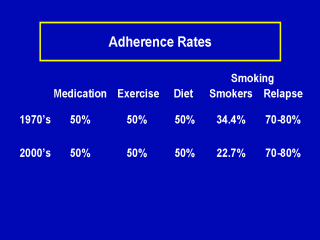 |
The unfortunate thing of it is we've not seen improvements in
how well people do. Whether we're talking about medication, exercise, diet, smoking
cessation or relapse, the data, unfortunately, have stayed the same. Unfortunately, taking
a look at the contributing factors for patients and telling them what to do ahead of time
in terms of medication, so they could develop a plan B, has not been a huge concern of
intervention strategy. The notion of developing back-up plans is not one that's seen new
life. We are seeing improved adherence to pharmaco-therapy, exercises and dietary
interventions in our research studies. These data reflect something of an overestimate. If
we look at the Surgeon General's report, for example, the proportion of older adults who
are exercising is significantly lower than this, and the proportion of adolescents who are
exercising is significantly lower than this. We're probably seeing figures more like this
and somewhat improved in the mid-life population. These are not public health
recommendations. This is therapeutic exercise. |
